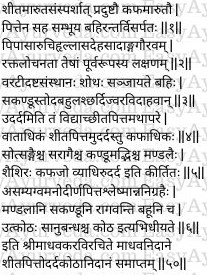Madhava Nidana Chapter 50 Sheetapitta, Udarda, Kotha Nidanam
This article explains Madava nidana 50th chapter “Sheetapitta Udarda Kotha Nidanam”. Causes, pathology and symptoms of Sheetapitta, Udarda and Kotha are explained in this chapter. Sheetapitta means urticaria, Udarda means erysipelas and Kotha means boils.

Table of Contents
Samanya Nidana
General causes for Sitapitta, Udarda, Kotha
By contact with a very cold breeze, kapha and vata get increase. These doshas get associated with pitta (increased by its etiological factors) spreads out externally (towards the skin) and internally (into blood and other tissues) and produces sitapitta, udarda and kotha. (1)
Read – Urticarial Rashes: Ayurvedic Understanding, Treatment, Medicines, Remedies
Purvarupa
Premonitory symptoms
The premonitory symptoms of the above-mentioned conditions are – thirst, loss of taste, nausea, debility in the body parts, and feeling of heaviness in the body and redness of the eyes. (2)
Read – Charak Samhita Kushta Chikitsa – 7th Chapter
Sanskrit Versus

Udarda Lakshana
Symptoms of Udarda
Swelling / elevated patches (rashes) resembling the rashes produced by the sting of the wasp produced on the skin, associated with itching and severe pricking pain, vomiting, fever and feeling of burning sensation are the characteristic features of Udarda. This condition is called Sitapitta by other experts. The difference in these two conditions is that in Sitapitta, vata is predominant and in udarda, kapha is predominant. (3-4)
Other form and presentation of Udarda
A condition manifesting with elevated patches which are reddish, have severe itching, caused by vitiated kapha during sisira rtu (late winter) is also known as udarda. (5)
Read – Udarda Prashamana Gana – Anti Allergic Herb Group Of Charaka
Kotha
Incomplete / inadequate or erroneous administration of emesis therapy (improper administration of emetics and other treatments), and suppression (obstruction) of the movement of pitta, kapha and anna (food) leads to the appearance of innumerable rashes, red in colour and highly itching is called as Kotha. If the same condition repeats (relapses) again and again, many times, it is called as Utkotha. (6)
Thus ends the chapter on Sheetapitta Udarda Kotha Nidanam in Madhava Nidana text written by Acharya Madhavakara.










